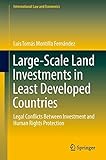Large-Scale Land Investments in Least Developed Countries [electronic resource] : Legal Conflicts Between Investment and Human Rights Protection / by Luis Tomás Montilla Fernández.
Material type: TextSeries: International Law and EconomicsPublisher: Cham : Springer International Publishing : Imprint: Springer, 2017Description: XIX, 344 p. 1 illus. online resourceContent type: text Media type: computer Carrier type: online resourceISBN: 9783319652801Subject(s): Law | Private international law | Conflict of laws | International law | Comparative law | Human rights | Trade | Law and economics | Development economics | Agricultural economics | Law | International Economic Law, Trade Law | Human Rights | Development Economics | Agricultural Economics | Private International Law, International & Foreign Law, Comparative Law | Law and EconomicsAdditional physical formats: Printed edition:: No titleDDC classification: 343.07 LOC classification: K3820-3836Online resources: e-book Full-text access
TextSeries: International Law and EconomicsPublisher: Cham : Springer International Publishing : Imprint: Springer, 2017Description: XIX, 344 p. 1 illus. online resourceContent type: text Media type: computer Carrier type: online resourceISBN: 9783319652801Subject(s): Law | Private international law | Conflict of laws | International law | Comparative law | Human rights | Trade | Law and economics | Development economics | Agricultural economics | Law | International Economic Law, Trade Law | Human Rights | Development Economics | Agricultural Economics | Private International Law, International & Foreign Law, Comparative Law | Law and EconomicsAdditional physical formats: Printed edition:: No titleDDC classification: 343.07 LOC classification: K3820-3836Online resources: e-book Full-text access | Item type | Current library | Collection | Call number | Copy number | Status | Notes | Date due | Barcode |
|---|---|---|---|---|---|---|---|---|
| E-Books | MEF eKitap Kütüphanesi | Springer Nature | K3820 -3836 (Browse shelf (Opens below)) | Available | NATURE | 1420344-1001 |
Browsing MEF eKitap Kütüphanesi shelves Close shelf browser (Hides shelf browser)
Acknowledgements -- I Introductory Part -- II What is 'Land Grabbing' -- III International Law Conundrum -- IV Opportunism in LSLI Contracts: An Economic View -- V Tackling Opportunism in LSLIs -- VI Concluding Remarks.
This book analyses large-scale land investments for agricultural purposes in Africa's least developed countries from a law and economics perspective. Focusing on the effects of foreign land investments on host countries' local populations and the apparent failure of international law to create incentives to offset them, it also examines the legal and economic mechanisms to hold investors accountable in cases where their investment leads to human rights violations. Applying principal agent and contract theory, it elucidates the sources of opportunism and develops control mechanisms to ameliorate the negative effects. It shows that although judicial mechanisms fail to deliver justice, international law offers alternatives to safeguard against arbitrary and abusive state and investor conduct, and also to effectuate human rights and, thus, tackle opportunistic behaviour.
5







